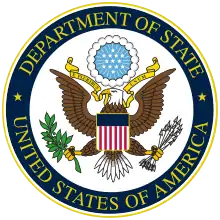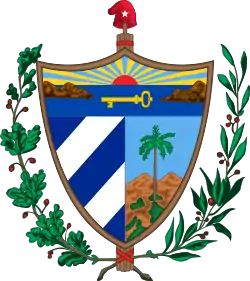List of ambassadors of the United States to Cuba
The United States Ambassador to the Republic of Cuba is the official representative of the President of the United States to the head of state of Cuba, and serves as the head of the Embassy of the United States in Havana. Direct bilateral diplomatic relations did not exist between the two countries from 1961 to 2015. President Dwight D. Eisenhower severed relations following the Cuban Revolution on January 3, 1961.[1] Relations were subsequently restored by Cuban President Raul Castro and President Barack Obama on July 20, 2015.
| Ambassador of the United States to Cuba | |
|---|---|
 Seal of the United States Department of State | |
| Nominator | The President of the United States |
| Appointer | The President with Senate advice and consent |
| Inaugural holder | Herbert G. Squiers as Envoy Extraordinary and Minister Plenipotentiary |
| Formation | May 20, 1902; reestablished July 20, 2015 |
| Final holder | Philip Bonsal (1960) |
| Abolished | January 3, 1961 - July 20, 2015 |
| Website | U.S. Embassy - Havana |
With the restoration of relations in 2015, the president may nominate an ambassador, though the position has remained vacant since 1960. The embassy is currently run by a Chargé d'affaires ad interim, Timothy Zúñiga Brown. The Chargé d'affaires and the embassy staff at large work in the American Embassy on the Malecón in Havana, Cuba.
History
Cuba was the last major Spanish colony to gain independence, following a lengthy struggle that began in 1868. José Martí, Cuba's national hero, helped initiate the final push for independence in 1895. In 1898, the United States fought a brief war known as the Spanish–American War, after the USS Maine sank in Havana Harbor on February 15, 1898 due to an explosion of undetermined origin. In December 1898, Spain relinquished control of Cuba to the United States with the Treaty of Paris. On May 20, 1902, the United States granted Cuba its independence but retained the right to intervene to preserve Cuban independence and stability in accordance with the Platt Amendment.
In 1902 the US established an embassy in Havana and appointed its first ambassador, Herbert G. Squiers. In 1934, the Platt Amendment was repealed. The United States and Cuba concluded a Treaty of Relations in 1934 which, among other things, continued the 1903 agreements that leased the Guantanamo Bay Naval Base to the United States. In 1959 Fidel Castro's 26th of July Movement overthrew the government of Fulgencio Batista and Batista fled the country on January 1, 1959. Relations between the United States and Cuba deteriorated rapidly as the Cuban government expropriated US properties and developed close ties with the Soviet Union. In October 1960, the US recalled its ambassador to protest Castro's policies. On January 3, 1961 the US withdrew diplomatic recognition of the Cuban government and closed the embassy in Havana. On September 1, 1977 the US established the United States Interests Section in Havana, located in its former embassy and operated under the auspices of the Embassy of Switzerland in Havana. The Interests Section was headed by Chief of Mission rather than an ambassador. Bilateral relations between the two governments resumed on July 20, 2015.
Ambassadors
Envoy Extraordinary and Minister Plenipotentiary (1902–1923)
- Herbert G. Squiers
- Title: Envoy Extraordinary and Minister Plenipotentiary
- Appointed: May 20, 1902
- Presented credentials: May 27, 1902
- Terminated mission: Left post, December 2, 1905
- Edwin V. Morgan[2]
- Title: Envoy Extraordinary and Minister Plenipotentiary
- Appointed: November 29, 1905
- Presented credentials: March 1, 1906
- Terminated mission: Left post, January 5, 1910
- John Brinkerhoff Jackson
- Title: Envoy Extraordinary and Minister Plenipotentiary
- Appointed: December 21, 1909
- Presented credentials: March 22, 1910
- Terminated mission: Presented recall, October 27, 1911
- Arthur M. Beaupre
- Title: Envoy Extraordinary and Minister Plenipotentiary
- Appointed: August 12, 1911
- Presented credentials: December 18, 1911
- Terminated mission: Left post, June 28, 1913
- William E. Gonzales – Political appointee
- Title: Envoy Extraordinary and Minister Plenipotentiary
- Appointed: June 21, 1913
- Presented credentials: August 9, 1913
- Terminated mission: Left post, December 18, 1919
- Boaz W. Long – Political appointee
- Title: Envoy Extraordinary and Minister Plenipotentiary
- Appointed: June 30, 1919
- Presented credentials: January 8, 1920
- Terminated mission: Left post, June 17, 1921
Ambassador Extraordinary and Plenipotentiary (1923–1933; 1934–1961; 2015–present)
- Enoch H. Crowder – Political appointee
- Title: Ambassador Extraordinary and Plenipotentiary
- Appointed: February 10, 1923
- Presented credentials: March 5, 1923
- Terminated mission: Left post, May 28, 1927
- Noble Brandon Judah – Political appointee[3]
- Title: Ambassador Extraordinary and Plenipotentiary
- Appointed: November 22, 1927
- Presented credentials: December 17, 1927
- Terminated mission: December 23, 1927; Left post, June 1, 1929
- Harry F. Guggenheim – Political appointee
- Title: Ambassador Extraordinary and Plenipotentiary
- Appointed: October 10, 1929
- Presented credentials: November 21, 1929
- Terminated mission: Left post, April 2, 1933
- Sumner Welles – Career FSO
- Title: Ambassador Extraordinary and Plenipotentiary
- Appointed: April 24, 1933
- Presented credentials: May 11, 1933
- Terminated mission: Left post December 13, 1933
- Note: Normal relations were interrupted on September 5, 1933; the new Government of Cuba was still unrecognized by the United States when Welles left post on December 13, 1933.
- Jefferson Caffery – Career FSO
- Title: Ambassador Extraordinary and Plenipotentiary
- Appointed: February 23, 1934
- Presented credentials: February 28, 1934
- Terminated mission: Left post, March 9, 1937
- J. Butler Wright – Career FSO
- Title: Ambassador Extraordinary and Plenipotentiary
- Appointed: July 13, 1937
- Presented credentials: August 23, 1937
- Terminated mission: Died at post, December 4, 1939
- George S. Messersmith – Career FSO
- Title: Ambassador Extraordinary and Plenipotentiary
- Appointed: January 12, 1940
- Presented credentials: March 8, 1940
- Terminated mission: Presented recall, February 8, 1942
- Spruille Braden – Political appointee
- Title: Ambassador Extraordinary and Plenipotentiary
- Appointed: December 20, 1941
- Presented credentials: May 19, 1942
- Terminated mission: Left post, April 27, 1945
- Raymond Henry Norweb – Career FSO
- Title: Ambassador Extraordinary and Plenipotentiary
- Appointed: May 21, 1945
- Presented credentials: July 24, 1945
- Terminated mission: Left post, May 22, 1948
- Robert Butler – Political appointee
- Title: Ambassador Extraordinary and Plenipotentiary
- Appointed: May 22, 1948
- Presented credentials: June 8, 1948
- Terminated mission: Left post, February 10, 1951
- Willard L. Beaulac – Career FSO
- Title: Ambassador Extraordinary and Plenipotentiary
- Appointed: June 20, 1951
- Presented credentials: September 20, 1951
- Terminated mission: Left post, August 9, 1953
- Arthur Gardner – Political appointee
- Title: Ambassador Extraordinary and Plenipotentiary
- Appointed: May 28, 1953
- Presented credentials: October 16, 1953
- Terminated mission: Left post, June 16, 1957
- Earl E. T. Smith – Political appointee
- Title: Ambassador Extraordinary and Plenipotentiary
- Appointed: June 3, 1957
- Presented credentials: July 23, 1957
- Terminated mission: Left post, January 19, 1959
- Philip W. Bonsal – Career FSO
- Title: Ambassador Extraordinary and Plenipotentiary
- Appointed: February 16, 1959
- Presented credentials: March 3, 1959
- Terminated mission: Left post, October 28, 1960
- Daniel M. Braddock was serving as Chargé d'affaires ad interim when the United States severed diplomatic relations with Cuba in January 1961.
Note: Normal relations were severed in January 1961 and were not re-established until July 2015.
- Jeffrey DeLaurentis: Chargé d'affaires ad interim from July 20, 2015 to July 7, 2017.
- Scott Hamilton: Charge d'affaires ad interim from July 7, 2017 to October 26, 2017.[4]
- Lawrence J. Gumbiner: Charge d'affaires ad interim from October 26, 2017 to February 11, 2018[5]
- Philip Goldberg: Charge d'affaires ad interim from February 11, 2018 to July 20, 2018
- Mara Tekach: Charge d'affaires ad interim from July 20, 2018[6] to July, 2020
- Timothy Zúñiga Brown: Charge d'affaires ad interim from July, 2020 [7]
Chiefs of the US Interests Section
The Interests Section operated from September 1, 1977 to July 20, 2015.
- 1977–1979: Lyle Franklin Lane
- 1979–1982: Wayne S. Smith
- 1982–1985: John Ferch
- 1985–1987: Curtis W. Kamman
- 1987–1990: John J. Taylor
- 1990–1993: Alan H. Flanigan
- 1993–1996: Joseph Sullivan
- 1996–1999: Michael Kozak
- 1999–2002: Vicki Huddleston
- 2002–2005: James Cason
- 2005–2008: Michael E. Parmly
- 2008–2010: Jonathan D. Farrar
- 2010–2011: Vacant
- September 2011–2014: John Caulfield
- August 2014–July 20, 2015: Jeffrey DeLaurentis
Notes
- United States severs diplomatic relations with Cuba History.
- Morgan was commissioned during a recess of the Senate and recommissioned after confirmation on December 11, 1905.
- Judah was commissioned during a recess of the Senate and recommissioned after confirmation on December 17, 1927.
- http://www.miamiherald.com/news/nation-world/world/americas/cuba/article160761564.html
- "Estados Unidos envía nuevo encargado de negocios a su embajada en Cuba". November 1, 2017.
- News, A. B. C. "Microwaves possible cause, not 'prime suspect' in US personnel illness in Cuba: Doctor". ABC News.
- "'It wasn't a friendly relationship.' Former top diplomat in Havana talks about U.S.-Cuba relations". Miami Herald.
References
- United States Department of State: Background notes on Cuba
 This article incorporates public domain material from the United States Department of State website https://www.state.gov/countries-areas/. (U.S. Bilateral Relations Fact Sheets)
This article incorporates public domain material from the United States Department of State website https://www.state.gov/countries-areas/. (U.S. Bilateral Relations Fact Sheets)
